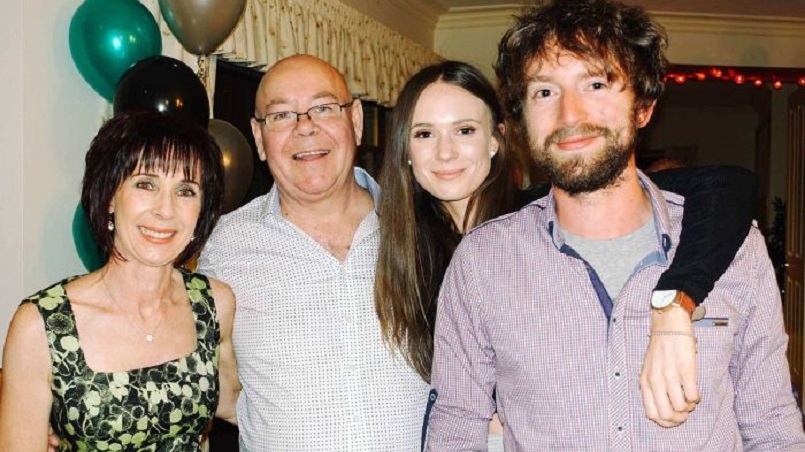
There is a small but real chance you don't realise the man you call dad isn't your biological father.
Up to 3 per cent of people are the genetic offspring of someone other than the man they think, according to UNSW Professor Rob Brooks and Swinburne University of Technology Professor Michael Gilding, who have both studied misattributed paternity.
Possible scenarios include mum having multiple sexual partners at the time of the child's conception, undisclosed adoption, medical mistakes, the parents using a sperm donor to conceive or "dad" arriving on the scene when the child is too young to remember.
In some cases, dad may not even realise himself.
Either way, on a peak-hour bus ride at least one passenger is likely mistaken about who their father is — could it be you?
'I felt like I didn't fit in'
As a child, Melburnian Nicola Trotman felt like the odd one out in her family.
Whether a wild imagination or instinct fuelled those feelings, they were validated when at nine years old her parents sat her and her older brother down for a serious chat.
"They tried to explain your dad is your dad but you don't have the same blood in you," Nicola, 26, said.
Nicola and her brother Daniel were conceived using the same donor sperm after their parents struggled for years to fall pregnant naturally.
Nicola said while the concept was confusing at first, it clarified why despite being a part of a loving family, she sometimes felt she "didn't fit in".
"From a young age I always thought I was adopted. Little things like my whole family could go out in the sun and tan, and I was always getting burnt," she said.
Nicola's dad, Kevin Trotman, said he and his wife Andrea were lucky to have the opportunity they did in the 1980s.
"Once it was determined I was of not much value, and that was after an operation and a few other things to try and repair my reproductive system ... at that point they suggested you could have a donor," Kevin said.
"The doctors went to quite a length to do the best they could with eye colour, hair colour and complexion to try and match the donor [with my appearance]."
He and Andrea had concerns about telling the children, but it was only a question of when, not if.
"Daniel was 11 going on 12, Nicole was about nine, so we didn't want to wait until Nicola was older and Daniel was well into his teens," he said.
"We were worried more probably about Nicola, because boys are boys — it goes in one ear and out the other — but Nic is a bit deeper."
Nicola put the news aside for a few years, until she was older and experiencing anxiety and depression.
"There is a history of mental illness on my mum's side ... but I wondered if there might be something from my biological father's side as well," she said.
"There was a lot of unanswered questions."
Truth bombs on your birthday
When Brisbane-based Kerri Favarato was greeted by her dad at the school gates to wish her a happy 13th birthday, she couldn't have predicted what was to follow.
The next day her mum, who had divorced from Kerri's dad several years prior, revealed he wasn't her biological father.
"I felt confused, numb. But actually not that unhappy at the time as I didn't have a good relationship with dad — that has since changed," the now 34-year-old said.
After "a tough" 22 years, Kerri found her biological father, Digger.
Kerri's parents had used donor sperm to conceive after having problems falling pregnant, despite the natural conception of their first daughter, born in 1977.
"Dad has been so helpful and supportive of me finding my biological father. Digger has also been awesome, more positive and responsive than I ever could have imagined," she said.
"He's welcomed me into his life and we're enjoying learning about each other and the family history."
Doubts about your dad?
Professor Michael Gilding said circumstances in which one might discover misattributed paternity were rare, but would include medical reasons or during relationship breakdowns.
"They might found out when they need a blood transfusion or organ transplant, for example," he said.
"The other situation is when there is some kind of dispute around a break-up of a marriage."
He said the number of paternity tests in Australia each year were relatively low, at about 10,000.
Ancestry senior marketing manager Nigel Seeto said it was possible users of a genealogy service could uncover their biological father was someone other than they thought, although the individual would more likely be focusing on uncovering new family connections rather than intentionally disproving them.
"The role of AncestryDNA isn't to clarify questions of paternity, however, the test does show DNA family connections, the strength of which is indicated by the number of shared DNA markers, so it can help clarify biological connections with immediate family and beyond," he said.
Chasing a 'sense of self'
Nicola is considering registering to find her biological father for medical reasons, and to assist with her "sense of self".
But she said no matter the outcome, she was grateful to the donor and her close-knit family.
"My brother and I were very loved growing up and we were kind of always told we were an incredibly long process to have, so it made us feel very special. My parents really wanted us."
Kevin said the family had been supported of Nicola's curiosity, but warned her to be prepared.
"We have cautioned Nicola that you might think you're getting close and you'll hit a brick wall. But that wall will be there for a reason and it needs to be respected and accepted," he said.
